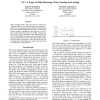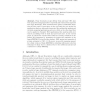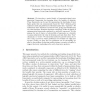129 search results - page 17 / 26 » Reasoning about multi-attribute preferences |
AAAI
2007
13 years 9 months ago
2007
When reasoning about actions and sensors in realistic domains, the ability to cope with uncertainty often plays an essential role. Among the approaches dealing with uncertainty, t...
OWLED
2007
13 years 9 months ago
2007
Fuzzy Description Logics (Fuzzy DLs) and fuzzy OWL have been proposed as languages able to represent and reason about imprecise and vague knowledge. Such extensions have gained con...
IPL
2008
13 years 7 months ago
2008
Slicing is a program transformation technique with numerous applications, as it allows the user to focus on the parts of a program that are relevant for a given purpose. Ideally, ...
IFIPTM
2010
13 years 6 months ago
2010
Abstract. In this paper, we examine a trust-based framework for promoting honesty in e-marketplaces that relies on buyers forming social networks to share reputation ratings of sel...
ARGMAS
2009
Springer
14 years 2 months ago
2009
Springer
Abstract. We introduce a special family of (assumption-based argumentation) frameworks for reasoning about the bene
ts of decisions. These frameworks can be used for representing t...



